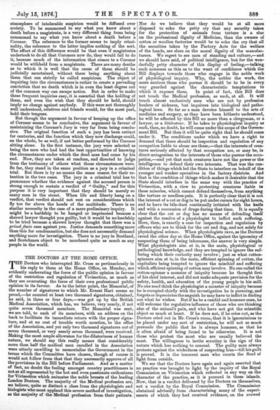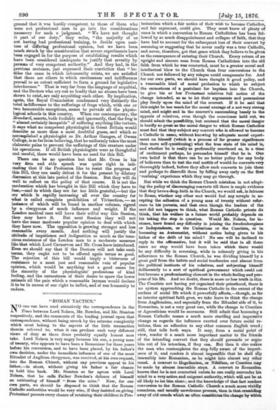THE DOCTORS AT THE HOME OFFICE.
THE Doctors who interrupted Mr. Cross so pertinaciously in his reply to them at the Home Office, on Monday, are evidently underrating the force of the public opinion in favour of the restriction and regulation of Vivisection, as much as they are overrating the force of their own professional public opinion in its favour. As to the latter point, the Memorial, of the number of signatures to which Mr. Ernest Hart seems so proud,—he counted at least two thousand signatures, obtained, he said, in three or four days,—was got up by the British Medical Association, which has, we believe, very nearly, if not quite seven thousand members. The Memorial was sent, we are told, to each of its members, with an address on the back to facilitate its immediate return with the proper signa- ture, and at no cost of trouble worth mention, to the office of the Association, and yet only two thousand signatures out of seven thousand, or very nearly seven thousand, were received. Making the most ample allowance for the dilatoriness of human nature, we should say this really means that considerably more than half the medical men enrolled in the Association were utterly unwilling to memorialise the Government in the terms which the Committee have chosen, though of course it would not follow from that that they necessarily approve of all the provisions in the Bill before Parliament. And as a matter of fact, no doubt the feeling amongst country practitioners is not at all represented by the hot and even passionate enthusiasm for Vivisection which animates the noble breasts of the leading London Doctors. The majority of the Medical profession are, we believe, quite as distinct a class from the physiologists and biologists who most applaud this severe method of investigation, as the majority of the Medical profession from their patients. Nor do we believe that they would be at all more disposed to echo the petty cry that any security taken for the protection of animals from torture is a slur on the professional dignity of Medicine, than the owners of cotton or woollen factories would be to echo the cry that all the securities taken by the Factory Acts for the welfare of the hands, are slurs on the moral dignity of the manufac- turers. We regret to see men of standing and culture,—and we should have said, of political intelligence, but for the won- derfully petty character of this display of feeling,—talking such nonsense as this as to the want of confidence which the Bill displays towards those who engage in the noble work of physiological inquiry. Why, the nobler the work, the more anxious those who pursue it should be to be in every way guarded against the characteristic temptations to which it exposes them. In point of fact, this Bill does not touch the Medical profession, as such, at all. It will touch almost exclusively men who are not by profession healers of sickness, but inquirers into biological and patho- logical laws. So far as a man devotes himself to the arts of medicine and surgery, as they have been hitherto understood, he will be affected by this Bill no more than a clergyman, or a lawyer, or a littirateur. If he takes to physiological inquiry as such, then, no doubt, he will come under the scope of the Govern- ment Bill. But then it will be quite right that he should come under it. The conditions under which we have a right to demand that there should be inspection and regulation of any occupation liable to abuse are these,—that the interests of crea- tures seriously affected by that occupation are, or may be, in direct antagonism to the interests of those who pursue the occu- pation,—and yet that such creatures have not the power or the intelligence to defend their own interests. That was the con- dition of things which led the State to interfere on behalf of the younger and weaker operatives in the factory districts. And that is the condition of things which makes it desirable that the State should interfere in the same way with the practice of Vivisection, with a view to protecting creatures liable to these miseries, which cannot defend themselves, from anything like torture or needless pain. It is perfectly clear that it is not the interest of a cat or dog to be put under curare for eight hours, and to have its bile-duct continually irritated with the knife and with a succession of drugs during that time. It is equally clear that the cat or dog has no means of defending itself against the resolve of a physiologist to inflict such suffering. Here, then, is exactly a case for inspection and regulation by officers who are to think for the cat and dog, and not solely for physiological science. When physiologists rave, as the Doctors raved the other day at the Home Office, against the ignominy of suspecting them of being inhumane, the answer is very simple. What physiologists aim at is, in the main, physiological or pathological knowledge, and they are tempted to ignore the suf- fering which their curiosity may involve-; just as what cotton- spinners aim at is, in the main, efficient spinning of cotton, the capitalists being tempted to ignore the mischief and suffering which efficient spinning of cotton may involve. No one called the cotton-spinner a monster of iniquity because he thought first of his chief interest, and did not make adequate provision for the safety, health, and education of the young people in his mill. No one need think the physiologist a monster of iniquity because he is occupied chiefly with the investigation he is pursuing, and forgets or depreciates the anguish he may have to inflict in finding out what he wishes. But if he be a candid and humane man, he will welcome the regulative influence of those who are thinking also of the animal's pain, and who have not got the scientific object so much at heart. If he does not, if he cries out, as the Doctors cried out in Mr. Cross's room, that it is ignominious to be placed under any sort of restriction, he will not so much persuade the public that he is always humane, as that he is often afraid of being found to be otherwise. It is not those who protest the most who are usually believed the most. The willingness to invite scrutiny is the sign of the nature which has nothing to conceal. The guilty man always protests against the wickedness of suspecting him—till his guilt is proved. It is the innocent man who courts the flood of light from outside. We see that the Doctors have again and again asserted that no practice was brought to light by the inquiry of the Royal Commission on Vivisection which reflected in any way on the character of the practice, as it is pursued in these islands. Now, that is a verdict delivered by the Doctors on themselves, not a verdict by the Royal Commission. The Commission abstained advisedly from characterising many of the experi- ments of which they had received evidence, on the avowed ground that it was hardly competent to those of them who were not professional men to go into the considerations necessary for such a judgment. " We have not thought it part of our duty," they write, "the majority of us not having had professional training, to decide upon mat- ters of differing professional opinion, but we have been much struck by the consideration that severe experiments have been engaged in for the purpose of establishing results which have been considered inadequate to justify that severity by persons of very competent authority." And they had, in the previous sentence, just expressed their conviction that " be- skies the cases in which inhumanity exists, we are satisfied that there are others in which carelessness and indifference prevail to an extent sufficient to form a ground for legislative interference." That is very fax from the language of acquittal, and the Doctors who cry out so loudly that no abuses have been shown to exist, are only acquitting each other. By implication, again, the Royal Commission condemned very distinctly the total indifference to the sufferings of frogs which, with one or two honourable exceptions, seems to pervade all the physio- logical schools in this country. When our contemporary, the Standard, asserts, both foolishly and ignorantly, that the frog is " almost certainly incapable" of suffering anything like torture, it says what no competent physiologist in Great Britain would describe as more than a most doubtful guess, and which so accomplished a physiologist as Dr. Arthur Gamgee, of Owens College, is so far from believing, that he uniformly takes the most elaborate pains to prevent the sufferings of this creature under his operations. If all British physiologists were as thoughtful and careful, there would have been no need for this Bill.
There can be no question but that Mr. Cross in his very firm and able speech was quite right in inti- mating that if the Profession like to resist the progress of this Bill, they can easily defeat it for the present by dilatory discussion at this late period of the Session. But they will do well to reflect on the policy of that course. It is not the moderation which has brought in this Bill which they have to fear,—and to which they are far too little grateful,--but the cry which is rapidly increasing all over the country for what is called complete prohibition of Vivisection, — an instance of -which will be found in another column, signed by a clergyman of much influence and weight. If the London medical men will have their wilful way this Session,
they may have it. But next Session they will not have the same moderate popular opinion to deal with which they have now. The opposition is growing stronger and less reasonable every month. And nothing will justify the attitude of impatience and indignation so much as the tena- cious resistance of the London men to a moderate measure like that which Lord Carnarvon and Mr. Cross have introduced. Even we should say that if the Doctors will not take such terms, they ought not to be offered again terms so good. The rejection of this bill would imply a bitterness of resistance to a most just and reasonable vein of popular opinion, which would be anything but a good omen for the sincerity of the physiologists' professions of kind feeling, and the earnestness of their desire to spare the lower animals all the pain which a reasonable layman would declare it to be in excess of our right to inflict, and of our humanity to endure.































 Previous page
Previous page